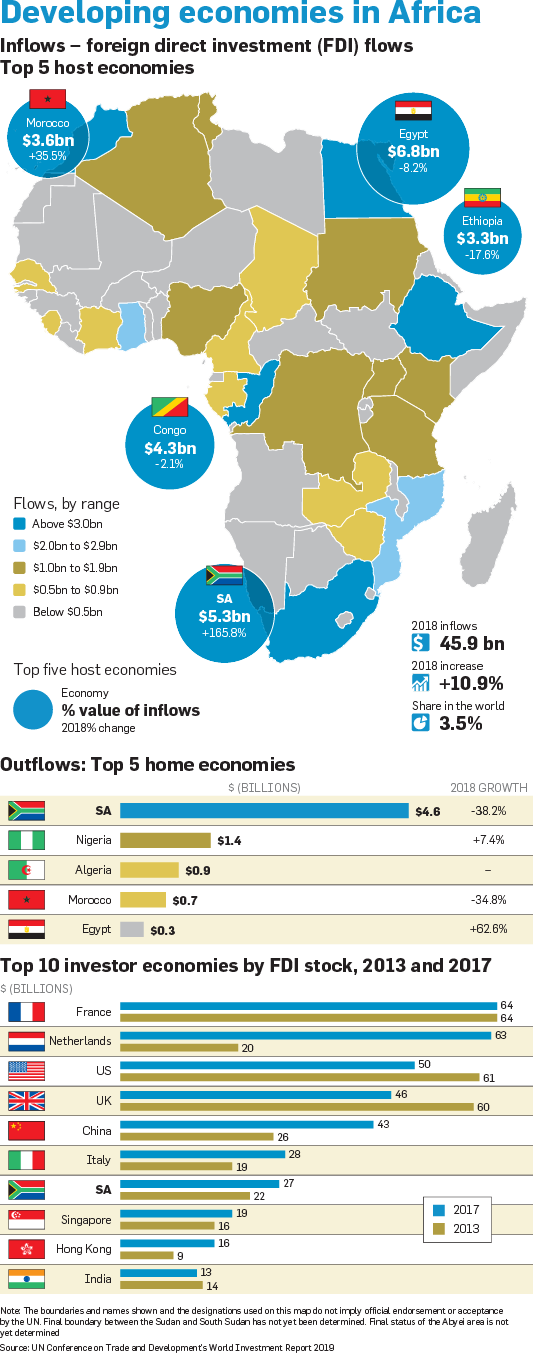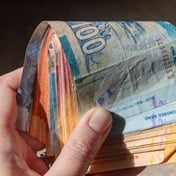
Foreign direct investment (FDI) flows into South Africa more than doubled to $5.3 billion (R78.5 billion) last year largely due to renewable energy and automotive investments from China, Germany and Japan.
According to the UN Conference on Trade and Development’s World Investment Report, which was released last week, this recovery in FDI came after several years of low-level inflows.
The investments began to increase after President Cyril Ramaphosa’s announcement ahead of the Commonwealth Heads of Government Meeting in London in the middle of April last year that he was aiming to entice investors to head to South Africa and so raise $100 billion in new investments over five years.
Last year, China-based carmaker Beijing Automotive Industry Holding opened a $750 million plant in the Coega Industrial Development Zone in Port Elizabeth, while carmakers BMW and Nissan expanded their existing facilities in the country.
In addition, Ireland’s Mainstream Renewable Power began building a 110MW wind farm in the Western Cape, with a planned investment of about $186 million.
The surge in South African inflows was largely due to intracompany loans, but equity inflows also recorded a sizeable increase.
FDI flows into South Africa last year ranked second in Africa behind Egypt, which received $6.8 billion, but ahead of the $4.3 billion that flowed in the Democratic Republic of Congo.
FDI flows to southern Africa recovered to nearly $4.2 billion last year from an outflow of $925 million in 2017.
Investments by South African companies boosted Morocco and Ghana last year.
The largest investment in Morocco was the acquisition of the remaining 53% of Saham Finances, Morocco’s largest insurer, by Sanlam Emerging Markets for $1 billion.
The largest merger and acquisition deal in Ghana last year was completed by Gold Fields, which bought a 50% share in Asanko Gold Ghana for $185 million.
FDI flows to the continent rose by 11% to $46 billion last year, despite declines in many of the larger recipient countries.
In contrast, global flows of foreign direct investments fell by 13% to $1.3 trillion.
“This represents the lowest level since the 2008 global financial crisis and underlines the lack of growth in international investment this decade,” the UN report said.
“The decline – the third consecutive year’s fall in FDI – was mainly due to large-scale repatriations of accumulated foreign earnings by US multinational enterprises in the first two quarters of last year following tax reforms introduced in that country at the end of 2017,” the report said.
The fall took place despite an 18% rise in cross-border mergers and acquisitions from $694 billion in 2017 to $816 billion last year.
The US led the FDI inflows with $277 billion last year, which was followed by China with $139 billion.
Among South Africa’s partners in the Brics group of countries, Brazil received $61.2 billion in FDI last year, India got $42.3 billion and Russia saw inflows of $13.3 billion.
On the other hand, FDI flows to developed economies dropped to their lowest point since 2004, declining by 27% to $557 billion.
Turning to the outlook, the UN report said that global investment was expected to see a modest recovery of 10% this year.
“Projections for FDI in 2019 point to a 10% increase to almost $1.5 trillion – still below the average of the past 10 years,” the report said.
FDI into Africa this year is expected to increase further to $52 billion.
“The ratification of the African Continental Free Trade Area agreement could also have a positive effect on FDI, especially in the manufacturing and services sectors,” the report said.
The report included a feature on special economic zones, which had grown rapidly to nearly 5 400 zones across 147 economies – up from about 4 000 five years ago – with many more planned.
“We are seeing explosive growth in the use of special economic zones as key policy instruments for the attraction of investment for industrial development. More than 1 000 have been developed worldwide in the past five years and, by the UN Conference on Trade and Development’s count, at least 500 more are in the pipeline for the coming years,” the report said.
In Africa, Kenya has the most special economic zones with 61. Nigeria has 38, Ethiopia has 10 and Cameroon has nine.
According to the UN report, there are 237 established special economic zones in Africa.
 |
| ||||||||||||
| |||||||||||||




 Publications
Publications
 Partners
Partners









